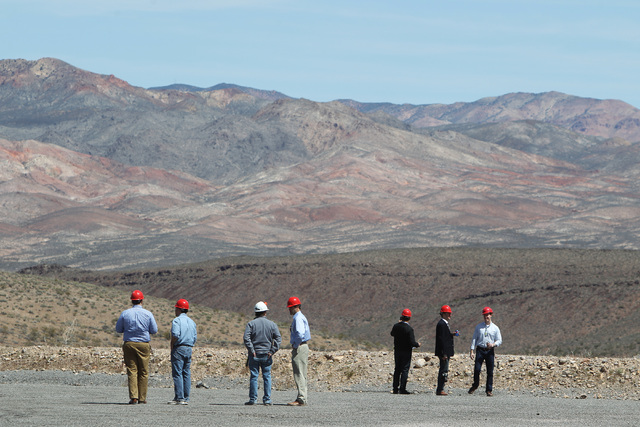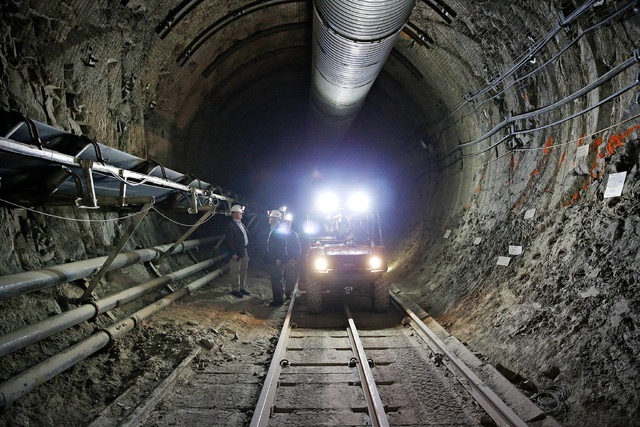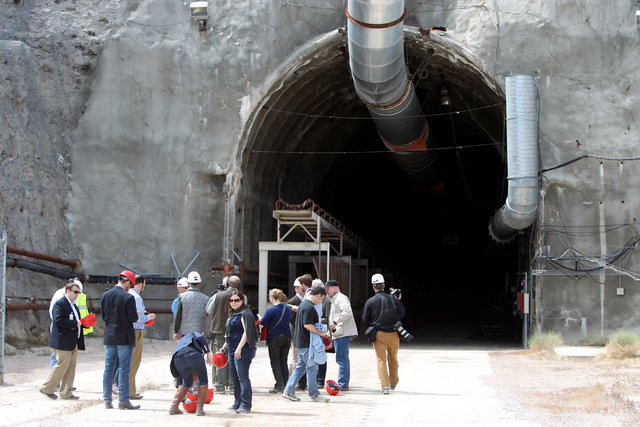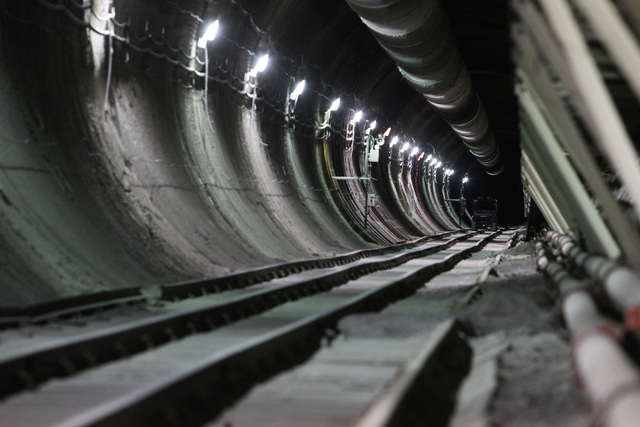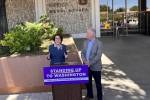Nevada lawmakers pledge fierce resistance to Yucca Mountain revival
WASHINGTON — A $1.1 trillion budget blueprint by President Donald Trump that includes a revival of Yucca Mountain as a repository for nuclear waste was declared “dead on arrival” Thursday by Nevada’s two U.S. senators.
And Nevada Gov. Brian Sandoval, a Republican, said opposition in the state to the proposal would be fierce.
“Any attempt to resurrect this ill-conceived project will be met with relentless opposition and maximum resources,” Sandoval said.
The president’s budget proposal for the 2018 fiscal year includes spending hikes that could benefit Nevada veterans and military, but it also includes sharp spending cuts that could impact research at UNLV.
Trump proposed $120 million to restart the licensing process to make Yucca Mountain the permanent storage of nuclear waste and to initiate an interim storage program.
It was that proposal that brought howls of opposition from Nevada lawmakers on both sides of the political aisle.
U.S. Sens. Dean Heller, R-Nev., and Catherine Cortez Masto, D-Nev., called the presidential proposal dead in Congress, where lawmakers control the authorization and appropriations process.
“Members of both parties keep trying to revive this dead project via the budget and appropriations process, but I will continue to fight those efforts,” Heller said.
Cortez Masto said, “Trump’s attempt to revive Yucca Mountain is naive and would be a colossal waste of taxpayer money.”
The two Nevada senators sent a letter to Energy Secretary Rick Perry and Mick Mulvaney, the Office of Management and Budget director, expressing their “vehement” opposition to the proposal.
Perry, in a statement, did not address the Yucca Mountain proposal but said, “Our goal in the budget process is to properly align resources to the important missions of the Department.”
A DOE spokesperson said the budget blueprint represents the administration’s top-level funding amounts, with specific figures in the 2018 budget coming in May.
“The budget will then be sent to Congress for review and debate, at which time we will be able to provide more details,” the spokesperson said.
Three members of the Nevada congressional delegation, Reps. Dina Titus, Ruben Kihuen and Jacky Rosen, all Democrats who represent districts in Clark and Nye counties, voiced their opposition to the Yucca Mountain project.
Nevada Assembly Speaker Jason Frierson, D-Las Vegas, and Assembly Minority Leader Paul Anderson, R-Henderson, also called the president’s proposal a dangerous risk for Nevadans.
“Unfortunately, the White House is completely ignoring the will and the safety of Nevadans,” Frierson said.
But the proposal was met with optimism by Dan Schinhofen, chairman of the the Nye County Commission. Yucca Mountain is located in Nye County, about 90 miles north of Las Vegas.
“Nye County couldn’t be more pleased,” Schinhofen said. “We have advocated for the rule of law and national security for 30-plus years.”
The 1982 Nuclear Waste Policy Act called for the federal government to provide a permanent repository for nuclear waste generated by nonmilitary reactors nationwide. Yucca Mountain was designated as the site for storage.
There are about 77,000 tons of nuclear waste being temporarily stored at various facilities.
President Barack Obama, at the behest of then Senate Majority Leader Harry Reid, D-Nev., withdrew funding for the licensing process, which effectively killed construction and development at the site.
State officials estimate that the licensing process for Yucca Mountain would take four to five years at a cost of $1.66 billion.
Nevada Attorney General Adam Laxalt said he has requested $7.2 million over the next two years to represent the state’s interest in the licensing process over Yucca Mountain, which he called a poster child of “federal overreach.”
“Nevada will continue to litigate this matter aggressively and fully,” Laxalt said.
Meanwhile, the president’s proposed budget calls for a $54 billion increase in military spending, including the purchase of additional F-35 Joint Strike Fighters. Nellis Air Force Base is expected to have 36 of the aircraft for testing and training by 2020.
Also in the budget is $4.4 billion to improve health care for the nation’s 9 million veterans.
But Trump also seeks deep federal cuts to increase spending for the military and homeland security, including $2.6 billion for a wall along the U.S.-Mexico border, of which $1.5 billion would be spent this year.
Rosen, who represents Nevada’s 3rd Congressional District, said the budget also would eliminate National Institutes of Health grants. In 2016, the NIH provided $7.3 million in research grants to UNLV and funding for the Southern Nevada Cancer Research Foundation.
And the budget would slice 11 percent from the Transportation Safety Administration, calling for the elimination of grants to local law enforcement that could affect McCarran International Airport and cities like Las Vegas and Henderson.
Rosen said the cuts would offset the border wall, “the worst deal that I’ve seen the president try to make.”
Contact Gary Martin at 202-662-7390 or gmartin@reviewjournal.com. Follow @garymartindc on Twitter.
RELATED
Texas files lawsuit over licensing of Yucca Mountain
Trump budget proposal revives Yucca Mountain spending
Nevada Legislature resolution denounces possible revival of Yucca Mountain project



